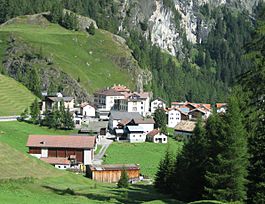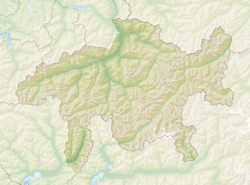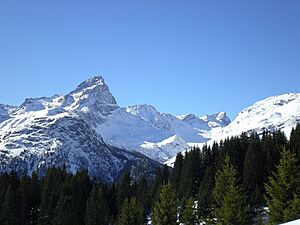Mulegns facts for kids
Quick facts for kids
Mulegns
|
||
|---|---|---|
 |
||
|
||
| Country | Switzerland | |
| Canton | Graubünden | |
| District | Albula | |
| Area | ||
| • Total | 33.80 km2 (13.05 sq mi) | |
| Elevation | 1,481 m (4,859 ft) | |
| Population
(Dec 2014)
|
||
| • Total | 25 | |
| • Density | 0.740/km2 (1.92/sq mi) | |
| Postal code |
7455
|
|
| Surrounded by | Avers, Bivio, Ferrera, Marmorera, Riom-Parsonz, Savognin, Sur, Tinizong-Rona | |
Mulegns is a small village in Switzerland. It used to be its own town, called a municipality. Mulegns is located in the Sursés area, which is part of the Albula district in the canton of Graubünden.
On January 1, 2016, Mulegns joined with several other nearby towns. These towns, including Bivio, Cunter, Marmorera, Riom-Parsonz, Salouf, Savognin, Sur, and Tinizong-Rona, all became part of a new, larger municipality called Surses.
Contents
History of Mulegns
Mulegns has a long history. Around 600 to 500 BC, people in the area were already busy. They built a copper mine and a place to melt metal (called a smelter) in a nearby valley called Val Faller.
The village of Mulegns itself was started much later, in the 1400s. It was founded by a group of people known as Walser. The first time Mulegns was written about in official records was in the year 1521.
Geography of Mulegns
Mulegns covers an area of about 33.8 square kilometers (about 13 square miles). A large part of this land is used for farming, about 30%. Forests cover nearly 10% of the area.
Only a small part of the land, less than 1%, has buildings or roads. The biggest part, almost 60%, is made up of natural features like rivers, glaciers, or mountains.
The village is found in the Surses area, within the Albula district. It sits along the road that leads to the Julier Pass. This road is also known as the Julienstrasse. Mulegns is also located at the entrance to a smaller valley called Val Faller. Before 1943, the village was known by a different name: Mühlen.
Population and People of Mulegns
Mulegns is a very small village. In 2014, only 25 people lived there. Over the past ten years, the number of people living in Mulegns has gone down by about 23.5%.
In the year 2000, the population was evenly split between males and females. There were 33 people living in Mulegns at that time. Most of the people were adults or older adults.
Many people in Mulegns have continued their education after high school. About 62.5% of adults aged 25 to 64 have completed extra schooling, like a university degree.
Mulegns has a very low unemployment rate, meaning most people who want to work have jobs. In 2005, there were 12 people working in farming. There was also one person working in the service industry, like in shops or hotels.
Here is a look at how the population of Mulegns has changed over time:
| year | population |
|---|---|
| 1850 | 120 |
| 1900 | 146 |
| 1950 | 109 |
| 1960 | 57 |
| 1970 | 66 |
| 1980 | 50 |
| 1990 | 37 |
| 2000 | 33 |
Languages in Mulegns
Most people in Mulegns speak a language called Rhaeto-Romance. In 2000, about 57.6% of the people spoke Rhaeto-Romance. The rest of the population, about 42.4%, spoke German.
Here is a table showing the languages spoken in Mulegns over the years:
| Languages | Census 1980 | Census 1990 | Census 2000 | |||
|---|---|---|---|---|---|---|
| Number | Percent | Number | Percent | Number | Percent | |
| German | 4 | 8.00% | 10 | 27.03% | 14 | 42.42% |
| Romanish | 46 | 92.00% | 27 | 72.97% | 19 | 57.58% |
| Italian | 0 | 0.00% | 0 | 0.00% | 0 | 0.00% |
| Population | 50 | 100% | 37 | 100% | 33 | 100% |
See also
 In Spanish: Mulegns para niños
In Spanish: Mulegns para niños
 | Bayard Rustin |
 | Jeannette Carter |
 | Jeremiah A. Brown |





